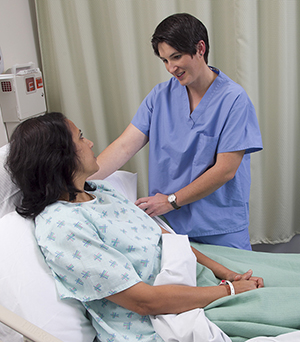After surgery, you’ll go to the recovery area. Once the anesthesia has worn off and your condition is stable, you’ll be moved to your hospital room. During your hospital stay, your healthcare team will work with you. They will help to control your pain, get you up and walking, and start you on an exercise program. Exercise will help to gently move and strengthen your new shoulder.
Your exercise program
After your surgery, you’ll start a gentle exercise program for your shoulder. This program may begin as soon as the day of your surgery. Your exercise program is a vital part of your recovery. How much strength and movement you regain in your shoulder and arm depends on how well and often you do your exercises.
-
Your surgeon or a physical therapist (a rehabilitation specialist) will start by gently moving your arm for you. This helps keep your shoulder from getting stiff.
-
Next, you’ll begin to move your arm with the help of your other arm.
-
As your shoulder heals, you’ll begin to lift and move your arm. This will help increase your range of motion and build strength in the joint. You may have motion or activity restrictions for weeks or months as you heal. Your healthcare provider may recommend that you limit external rotation (rotating your shoulder away from your body).
Going home
The hospital staff will talk with you about your home recovery. They’ll show you how to bathe without getting your incision wet. You’ll also learn how to do other home activities without injuring your shoulder. Arrange to have someone drive you home. You won’t be able to drive for at least
Featured in


